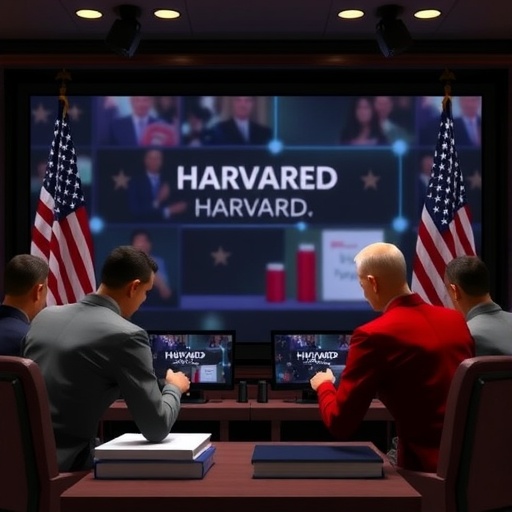In an era dominated by digital echo chambers and escalating political polarization, a groundbreaking innovation from Harvard University is redefining how Americans engage across ideological divides. The advent of algorithm-fueled social media platforms has entrenched a fractured information landscape, deeply segregating the public along partisan lines. However, a novel digital intervention named Tango promises to bridge this social chasm by harnessing cooperation and competitive gaming mechanics to foster genuine bipartisanship.
Tango is a virtual quiz-based game that pairs Democrats and Republicans on shared teams, encouraging collaboration rather than confrontation. Unlike the toxic spiral of divisive posts rampant on social media, this game leverages teamwork as a competitive advantage, uniting individuals with opposing ideologies toward a common goal. The game’s premise is simple yet profound: cooperation between political rivals not only benefits team performance but also gradually humanizes perceived opponents, diminishing partisan animosity.
This innovation stems from a rigorous and extensive research project led by Harvard psychologist Joshua D. Greene, along with Ph.D. candidate Lucas Woodley, and involved the support of organizations including the Global Development Incubator. Their recent study, published in the prestigious journal Nature Human Behaviour, presents compelling evidence that Tango measurably reduces negative partisanship and enhances interpersonal warmth and generosity among its players. Nearly 5,000 participants across the United States took part in randomized controlled trials, revealing effects that could potentially roll back societal polarization by an estimated fifteen years.
Central to Tango’s efficacy is its design, which comprises three rounds of trivia questions crafted to challenge and affirm political beliefs simultaneously. The questions deliberately draw from culturally partisan knowledge domains; for instance, queries leaning towards Democratic cultural touchstones such as Netflix’s “Stranger Things” contrast with questions favoring Republican-associated knowledge like the cast of “Duck Dynasty.” This strategic content ensures equal footing and encourages mutual engagement by both ideological factions.
Moreover, the game includes “uncomfortable truths” for each side, presenting facts that challenge partisan narratives while maintaining accuracy and respect. For example, left-leaning players are exposed to data reflecting lower crime rates among immigrants, while right-leaning contestants learn about the relatively rare involvement of assault-style weapons in gun deaths. This balanced approach is central to facilitating cognitive flexibility without triggering defensive backlash.
Integral to the interactive experience is the chat function, where the two-player teams coordinate their answers in real-time. This feature fosters dialogue, debate, and collaborative problem-solving, creating a dynamic social environment rarely found in conventional partisan interactions. According to Woodley, the blend of friendly banter and mutual celebration over correct answers contributes significantly to the game’s long-term positive impact by building rapport between players.
One of the most remarkable findings from the trials was observed in a behavioral economics experiment embedded within the study. Teams received a hypothetical $100 to distribute as they wished, revealing that participants paired with political opponents demonstrated significantly higher generosity towards those rivals. This outcome underscores the depth of empathy and trust cultivated in just one hour of gameplay—a duration that led to sustained attitudinal shifts lasting up to four months in some cases.
This effect’s durability is particularly noteworthy given the typical challenges faced by social interventions aimed at mitigating polarization. The researchers emphasize that even a single session of Tango catalyzes measurable changes that persist over extended periods, an achievement that many traditional approaches have failed to attain. Greene’s extensive body of work, including his seminal book Moral Tribes: Emotion, Reason, and the Gap Between Us and Them, provides the theoretical foundation for this practical application, drawing on principles of cooperation and shared identity.
The scalability of Tango is another key advantage targeted by its creators. While the initial deployments reached thousands of college students at institutions such as Harvard, Cornell, Stanford, and the University of Missouri, the platform has successfully expanded to corporate environments, including a Fortune 500 company trial. These varied settings demonstrate Tango’s versatility and its potential for broad societal impact beyond academic confines.
Recognizing the global relevance of political divisions, the research team is actively adapting Tango for international contexts. Pilot programs are underway in Israel, while question sets tailored to the cultural-political landscapes of India and Northern Ireland are in development. Such adaptations indicate a promising future for Tango as a tool for fostering constructive dialogue in polarized societies worldwide.
Despite the inherent challenges of requiring simultaneous participation between ideologically diverse players, the team has devised creative distribution strategies to encourage widespread engagement. From envisioned group events akin to community “game nights” to innovative informal settings like bars, Tango’s developers aim to embed the game into everyday American life, facilitating serendipitous encounters between political adversaries.
In sum, Tango exemplifies how thoughtfully designed digital platforms can combat entrenched social fragmentation. By harnessing competitive collaboration and carefully calibrated content, it transforms interactions between Democrats and Republicans from adversarial conflict into a shared quest for victory. This paradigm-shifting approach not only diminishes partisan hostility but also nurtures enduring social bonds rooted in mutual respect and understanding.
As algorithm-driven polarization continues to challenge democratic discourse globally, scalable interventions like Tango offer a beacon of hope. They underscore the profound potential of combining behavioral science, technology, and game theory to heal societal rifts and cultivate a more empathetic and united citizenry.
Subject of Research: Political polarization and bipartisan cooperation through digital interventions
Article Title: [Not specified in the provided content]
News Publication Date: June 3, 2025
Web References:
- Tango official site
- Joshua D. Greene’s Harvard Psychology profile
- Nature Human Behaviour article DOI
References:
- Greene, J. D. (2013). Moral Tribes: Emotion, Reason, and the Gap Between Us and Them.
Keywords: Political polarization, Bipartisanship, Social media algorithms, Behavioral science, Cooperation, Digital intervention, Randomized controlled trial, Generosity, Political psychology, Game theory, Social cohesion, United States, Cross-partisan dialogue




